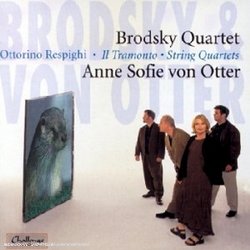TO MAKE HARD HEARTS DISSOLVE
DAVID BRYSON | Glossop Derbyshire England | 01/27/2009
(5 out of 5 stars)
"Composing instrumental music was for Germans, said Verdi. Verdi of course wrote a string quartet, and a very fine one. However it has the sense of an etude about it, as if he felt that he had not yet demonstrated what he could really do and wanted to practise a few techniques before setting about the Requiem and what came after that. Respighi and some others obviously thought differently. Why should Italy accept any such self-denying ordinance? Respighi did not forsake opera, but he took instrumental composition seriously, and if you, like me, only really know him from his Pines, Fountains and Festivals of Rome, then you may get a pleasant and interesting surprise on discovering the more inward side of his musical personality.
An Italian composer wanting to swim in the instrumental mainstream had nothing much to guide him by way of Italian precedents. The melodies in Verdi's slow movement and in the trio of his scherzo could be straight out of his operas, and the main theme of the first movement itself suggests Amneris. The liner note writer with this disc believes that the real influences here are Brahms, Debussy and Ravel, and the Russian school. I agree in general. The sound at the start of the D major quartet is very Brahmsian, for instance, and I thought I heard Borodin elsewhere. If you are starting to suspect that the musical idiom is fairly conservative, you are right. It is not reactionary by any means, but this is the era of Bartok and Britten, and they were going in other directions in their quartets.
Where there is genuine Italian influence it comes from further back in history, and the other quartet here is explicitly entitled 'Dorian'. Verdi himself, for all his calculated smokescreen of claiming small learning, knew the 16th century polyphonists very well indeed, and there are modal harmonies at the Pie Jesu of the Requiem and also in the Quattro Pezzi Sacri. The overtly learned Respighi felt no need to put on such an act, and in addition the Dorian Quartet parades an imposing variety of technical resources, as well as being very reminiscent of Schubert's Wanderer Fantasy in its structure consisting of one continuous piece subdividing into the familiar four sections standardised by Haydn for quartets and symphonies.
However what really grabs me on this disc is not so much the two beautiful and admirable quartets as Il Tramonto (The Sunset), a setting of Shelley for female voice with the four strings. First of all the poem makes me catch my breath, and I am not going to give away in a review what it says. Reading it, I feel that in my main poetry-reading phase 50 years ago I underappreciated Shelley (is the word to use these days 'misunderestimated'?). If so I was probably not alone in this error, because I find Housman complaining of it half a century before my time. It is this piece most of all that changes my view of Respighi by its quiet understated idiom. Anne-Sofie von Otter, not one for understatement in other work that I have from her, seems to confirm this view, and the whole effect is mesmerising.
Really, everything about this disc is admirable. I take great satisfaction in having spotted what the Brodsky Quartet amounted to when I first heard their Tchaikovsky set. The music itself is highly appealing of course, but any music at all would benefit from presentation of this quality. The recorded sound is from 1999 and 2000, and it seems excellent to me as well. The liner note is informative and helpful, but the humour of the cover is just plain naff, although it tickles me and it must have been done with the full connivance of the diva herself. What it depicts is the members of the quartet contemplating a photo of - an otter! Otters are most beautiful beasts, and the eponymous diva sings so as to achieve what my caption (a snippet from the Shelley poem which in its real context expresses something very different indeed) tries to say."
Best string quartets since Beethoven's
Adrian | Gold Coast, Australia | 02/22/2007
(5 out of 5 stars)
"I've now heard 3 great recordings of Il tramonto and Anne Sofie von Otter's interpretation is by far the best. Also the Brodsky Quartet is the best quartet I've ever heard; the first violinist is amazing. I suggest also tracking down a recording with Respighi's D minor String Quartet as well. These 3 string quartets are better or at least more enjoyable than anything Bartok ever composed.
Highly recommended!"


 Track Listings (6) - Disc #1
Track Listings (6) - Disc #1